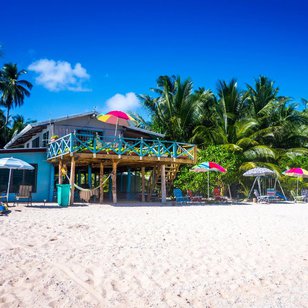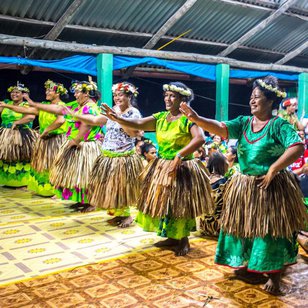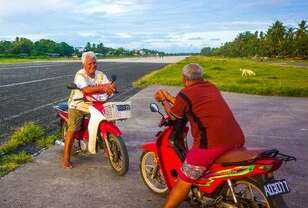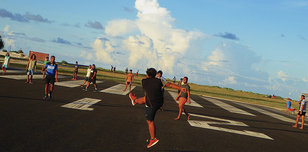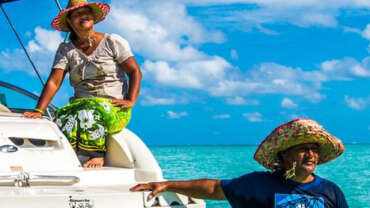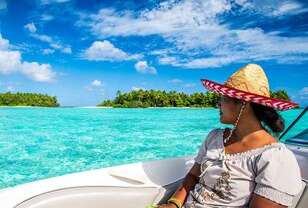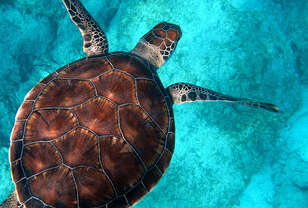Experiences in Tuvalu
Cultural and Traditional Dance
If you are in need of a little culture, you can head along to your nearest Maneapa (local town hall). Throughout the year numerous traditional and cultural ceremonies are performed. Chat with the staff at your hotel. They will know about all upcoming events and can advise you on where to go and what to wear.
There is also two nightclubs on the island that operates only on weekends (except Sunday) if you’d like to have a glimpse of the island dance and music; the “Matagigali” bar near the airstrip and “Tefota”.
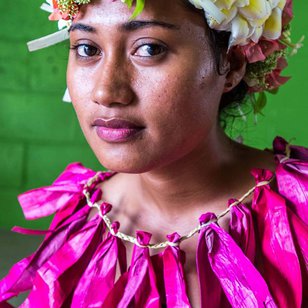
Save Tuvalu and Save The World
Scientists are predicting that by the end of this century the oceans could be one meter or more above their current levels. Coastal regions will be flooded and low-lying nations such as the tiny South Pacific country of Tuvalu could be submerged.
The impact of rising seas and the increase in extreme weather events can already be seen in Tuvalu. It is one of 22 Pacific island nations with 7 million inhabitants between them that contribute only 0.06% of global greenhouse gas emissions but are three times more vulnerable to climate change than countries in the North.
At the primary school in Funafuti, children are taught about climate change from the age of six. They are also learning what it means to emigrate because this could be the last generation of children to grow up in Tuvalu. Its people are already in flight. More than 4,000 live in New Zealand, and the Tuvaluan government is planning the migration of the remaining 10,000.
History and Archaeology
During the World War II, large numbers of American troops were stationed on the islands of Tuvalu and airforce bases were strategically located to allow the allied forces to attack enemy bases in Kiribati. An old runway exists on the northeastern side of Nanumea and the remains of World War II planes are visible in the scrub. A wreck of a landing craft can be seen on the reef near the village on Nanumea. There is another World War II airstrip on the islet of Motulalo in Nukufetau, along with the remains of plane wrecks.
Funafuti atoll was the main base and remains of World War II debris can be seen along the main island of Fongafale. A well-preserved underground bunker is found on the islet of Tepuka. On Funafuti, the site of the drilling by scientists to prove Darwin’s theory on the formation of atolls can be found. Darwin’s theory was proved to be correct and evidence of submerged volcanoes was found after drilling to a depth of more than 1000 feet.
Another attraction on Funafuti is “David’s Drill.” Scientists from the Royal Society of London conducted experimental drilling in the late 1800s to test Charles Darwin’s theory of atoll formation. Darwin, the famous formulator of evolution theory, believed that all coral atolls rest on a volcanic base. The deepest bore at David’s Drill reached 928 feet but did not hit volcanic rock. A second attempt also failed but modern science has proved that Darwin was correct. The boreholes can still be seen to this day in Fongafale village.
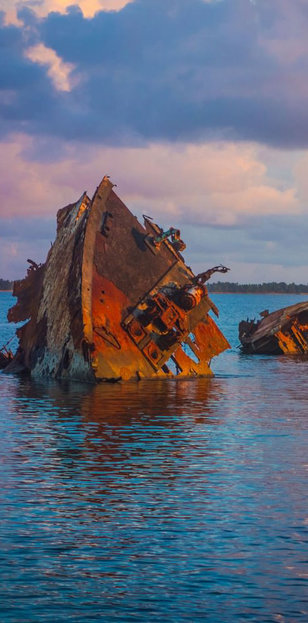

Tuvalu National Library & Archives
The Tuvalu National Library and Archives is a department under the Ministry of Education, Youth and Sports Tuvalu Government. The department also enforces Copyright and the destruction of public records. The Tuvalu National Library and Archives is the only library in Tuvalu offering library services to the people of Tuvalu and its Government. It also provides archival services and other record management services to the people and the Government.
The Tuvalu National Library and Archives was established on 1st September 1978. In leading up to the political independence from the British Colony, Tuvalu needed a library and archives to safeguard Tuvalu Cultural, Political and Public records. Since its establishment, the Tuvalu National Library and Archives has been a house on an old Red Cross building in the capital Funafuti.
Tuvalu Women’s Handicraft Centre
Tuvalu fans, mats, baskets, necklaces, woodcarvings and fishhooks are famous throughout the Pacific. These can be purchased at the Women’s Handicraft Center near the airport, from small handicraft stalls outside the airport and on each of the outer islands.

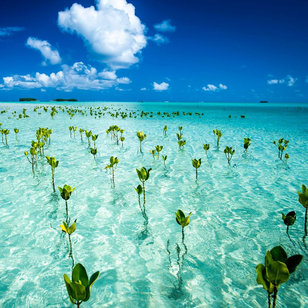
Tuvalu Mangrove Planting
Mangrove planting project in Nanumea atoll.
Conservation benefit: Establishment of a two-acre lagoon-based mangrove nursery/reserve and planting of 1,000 mangrove seedlings along a one-kilometer (.62-mile) coastline for 10 years.
Community benefit: Refurbishment of a handicraft center.
This remote, small island nation is located in the South Pacific about 813 miles south of Tarawa, Kiribati and 638 miles north of Suva, Fiji. Its nine atolls have a total land area of under 10 square miles with the highest elevation above sea level of only 16 feet. A major threat to Tuvalu’s subsistence is the degradation of both land and marine resources. Sea level rise caused by climate change is a major contributor to this degradation and loss of biodiversity and natural resources.
Mangroves are an important resource here. They enhance local fisheries, provide material for handicrafts and firewood, and protect the islands from tidal and storm surge. The Tuvalu National Council of Women (TNCW) has long recognized the importance of mangroves and the need for better lagoon and coastal protection for Tuvalu’s small atoll islands.
TNCW, together with the Tuvalu Association of Non-Government Organizations (TANGO), has proposed an expansion project for the outer islands to replant mangroves and seedlings of Beauty Leaf Laurel in areas threatened by coastal erosion. Community members would like to refurbish their existing handicraft center by adding two rooms to use for training, meetings, and handicraft production. The project will also engage women and youth in planting a two-acre lagoon-based mangrove nursery/reserve. A one-kilometer stretch of coastline will be planted to protect the main village area on Nanumea.
Afelita Day Tour
Take a 10-min boat ride from Funafuti, the biggest and most populated atoll in Tuvalu, and find yourself in Afelita Island where for only AUD$150.00 (appx. idea) a day you can have the whole island to yourself and a chef who cooks authentic Tuvalu cuisine from freshly caught tuna and vegetables from the back garden.
